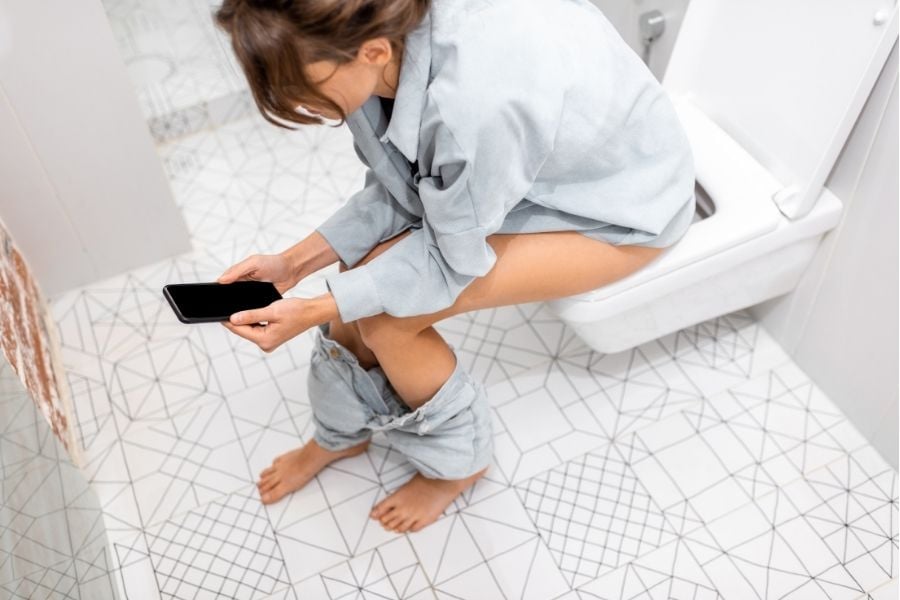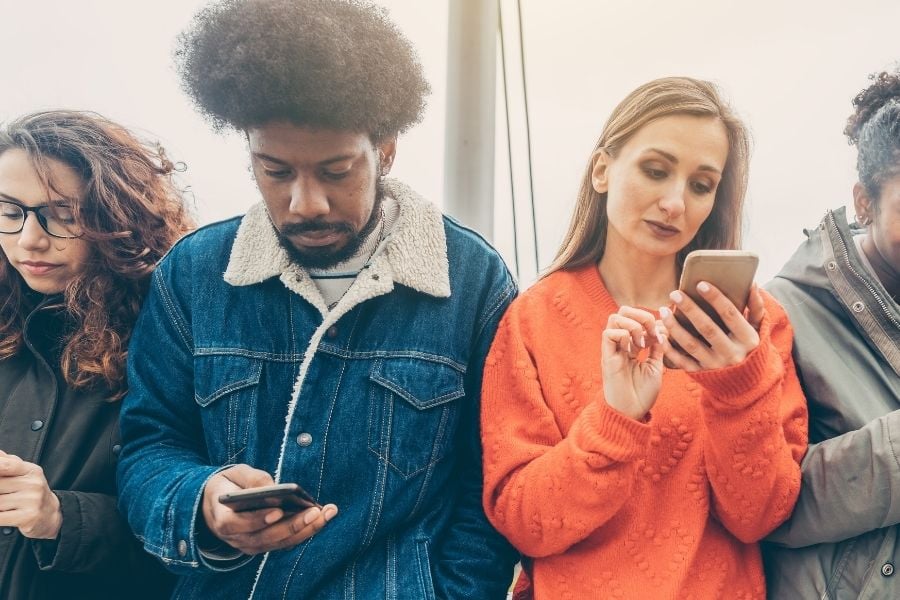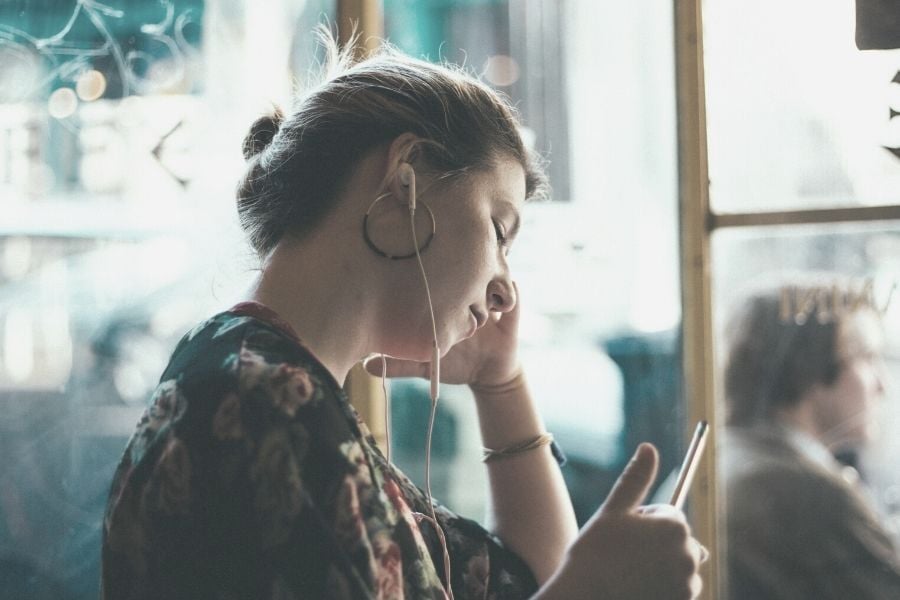It would simply be an understatement to say that we’re attached to our phones. We have the power to do nearly anything in the palm of our hand! Want to skip the line at Starbucks? Need an Uber ride across the city? Got a hankering for Thai food at 10 pm? Consider it done.
With recent restrictions from the current pandemic, we’re using our phones more frequently—and it’s easy to understand why. We’re isolated, spending less time with others, and need ways to keep our brains entertained. One of the easiest ways to stay connected is through social media, and if you own a mobile device, there’s a good chance you use some form of it.
But could social media have negative side effects that we aren’t always aware of?
“Social media definitely has an impact on mental health,” says Adam Brotherwood, Therapist at HealthOne. “It can have a positive impact in regards to connecting with friends, families, and communities. But it can also become a place where we compare ourselves to others and feel left out of certain things.”

If you’re unsure of where you stand, you’re not alone. While many studies have been done exploring the link between social media and mental health, it’s still difficult to conclude if there’s a direct correlation or not.
Everyone’s experience is different, so we recommend using social media in whatever way feels right for you. Regardless of how often you use it, taking a break can be a great way to give your mind some time to unwind. We sat down with Adam to learn more.
What Is Social Media?
To bring it back to basics, the Merriam-Webster dictionary defines social media as “forms of electronic communication through which users create online communities to share information, ideas, personal messages, and other content.”
The usage of social media has grown exponentially over the years, with the global digital population reaching an astounding 4.14 billion users in October of 2020! Popular platforms like Facebook, Instagram, Twitter, LinkedIn and TikTok make it easy to connect with others across the world in unique and exciting ways.
“I think people are starting to be more aware, especially with COVID, of their use of social media,” Adam says. “We’re seeing a lot of things come to light during this time, like misleading information about vaccines, for example.”
It’s great to have the option of expressing your thoughts online, however, being in such a heavily-populated online space can have its downsides. As Adam points out, it can often be difficult to tell what’s credible and what’s not.
“People are becoming wearier, and more aware, of how social media companies feed us certain information. So, I find that most people right now want to cut it down, or take a break from it,” he adds.
So, how do you know if your brain needs a break from social media? Here are three signs to look out for.
1) You're Checking Your Phone Too Frequently
Picking up your device when you see a notification is normal. But if you’re constantly reaching for it all day long, Adam says, you might be in need of a detox.
One of the most common reasons people reach for their phones so often is because they’re bored. With restricted access to social events, hobbies, and the life we lived before the pandemic, it’s no surprise that many of us feel this way. When your brain needs a pick-me-up, the endless world of scrolling is an entertaining place to be. It’s easy to let the seconds, minutes, and hours slip by without realizing how much time has passed.
Another reason for checking your phone too often is if you experience nomophobia, aka the fear of not having your phone or not having access to it. While this isn’t a formal diagnosable phobia, more and more research points to the symptoms and signs of it. It’s especially common in younger adults.
Symptoms to look out for include constantly checking your phone (including multiple times an hour), taking it places like the bedroom or bathroom, or feeling helpless when you don’t have access to it. If you experience worry, fear, or anxiety around your phone, this is a telltale sign that your mind and body could use a break from it.

2) Social Media Is Impacting Your Mood
How many times have you compared yourself to someone online? Be it a celebrity, influencer, or someone you know personally—we often find ourselves being self-critical in response to what someone else posted. If you begin to find that social media is impacting your emotions, you might be in need of a detox.
“After using Instagram, for example, people may feel less positive, feel a bit down, or angry. It might be in response to people’s comments or posts because they don’t sit well with their values and beliefs,” Adam explains.
Pay attention to the types of accounts you follow and the content they post. Do certain topics, like news channels, make you angry or upset? Do you spend time reading comment sections or negative conversations between others? Take a real, unbiased look at how posts impact your emotions and try to minimize your time consuming those things. Focus on content that evokes good feelings, and better yet, take a break from the online world altogether.
3) Social Media Is Impacting Your Relationships
It’s ironic, to be frank, that the apps meant to connect us can make us feel further apart. Likes, comments, and direct messages have replaced many of the face-to-face interactions we once knew. If your social media usage is impacting relationships with those close to you, it’s a third sign worth noting and it might be time for a break.
“We’re sitting around on our phones and tablets rather than interacting,” says Adam. “It isolates us from each other, and that can turn into a habit or pattern of behaviour that’s hard to break.”
When everything is done digitally, it can be easy to misunderstand someone or make assumptions that aren’t true. You might even experience feelings of FOMO (the fear of missing out) when looking at photos others post.
While the current pandemic puts limits on what we can do in-person, there are still other ways to stay connected. Instead of commenting on a loved one’s post, opt for something more personal like a voice call or video message. You can always go back to basics, too, by sending a hand-written card in the mail. Feelings of anxiety aren't pleasurable in anyone’s social life, so consider taking a break if it’s impacting your relationships.
When it comes to digitally detoxing, everyone’s preference is different. You can uninstall apps on your phone for some time, or delete your accounts altogether. Many mobile devices also have screen time functions where you can set limits on how much you use certain apps. Whatever a “detox” looks like for you is likely to have a big impact on your emotional well-being. If your symptoms continue long-term, however, it may be worth seeking additional help.

Stress in Today’s World
We’ve all felt stressed at one point or another. The Centre for Addiction and Mental Health defines it as, “a normal response to situational pressures or demands.” Stress is part of our everyday experience because it activates our body’s necessary fight or flight response.
When stress becomes chronic or long-term, however, it poses more challenges to our mental health. And there's plenty of reasons for us to feel this way with today’s current events.
“There’s the stress of paying bills, of work, dealing with family, being uncertain about the future, and stress of the unknown,” Adam explains. “There’s still a lot of unknowns with the vaccine, and a lot of things are happening in the world other than COVID.”
With all of this information easily accessible online, it’s clear that social media can magnify the stress of our everyday experience. So, what steps should you take to help manage your stress?
“I think people need to identify the sources of their stress and see if they can change anything about it,” Adam recommends. “Change it, adapt to it, see if you need to create some more boundaries.”
If social media is causing you stress, a detox is a great way to start exploring what those boundaries might look like. Along with this, speaking with trusted friends and family can help you feel more supported and understood. “Often, we think we’re in the boat alone, but it’s nice to know people are dealing with the same types of things. It’s nice to hear different perspectives on what might be causing stress and how we’re dealing with it,” Adam shares. You can also incorporate stress management techniques like deep breathing, yoga, or acupuncture to manage your symptoms.
If your stress is more chronic or accompanies symptoms of depression, you might benefit from visiting a therapist. According to Adam, they often go hand in hand. “You can have one without the other, but usually they present themselves together, especially now,” he explains.
Depression and When To Get Help
As stated by the Centre for Addiction and Mental Health, “Depression is a word that is used both for a sad, despairing mood and for a psychiatric disorder. Sometimes, a depressed mood can persist and become a more serious mental health problem, commonly referred to as clinical or major depression.”
Pinpointing whether you’re sad or experiencing symptoms of depression can be tricky. Understanding the signs and recognizing your own behaviours is one of the first steps you can take towards positive change.

“Being sad is usually gone in a day or a couple of days,” Adam explains, “whereas depression can last from two weeks to many months or years. Depression includes a lack of motivation, decrease in energy, hopelessness, emotional swings, and trouble sleeping or getting too much sleep. Getting sad is more of an emotion, which can come and go like the weather.”
Facing symptoms of depression can make you feel isolated and alone. For many people, these emotions are only amplified by the time they spend online. This is why it’s important to reach out for help if your struggles are ongoing.
“If someone thinks they are depressed, they should definitely talk to their doctor about it,” Adam recommends. A doctor will often refer you to counselling or prescribe medication depending on your unique needs. Although it’s challenging to face feelings of depression, talking about it is the first step. “Often when we’re in that state, we need a boost and the support of others to handle it,” he adds.
At HealthOne, we have both family doctors and therapists on our team who can help you on the path towards inspired living. As our reality continues to evolve each day, we’re here to help you find balance and effective ways to cope. A social media detox is a great way to give your mind a break. But for the ongoing support of more serious signs or symptoms, our team is here to help you.
One life. Live Inspired.


